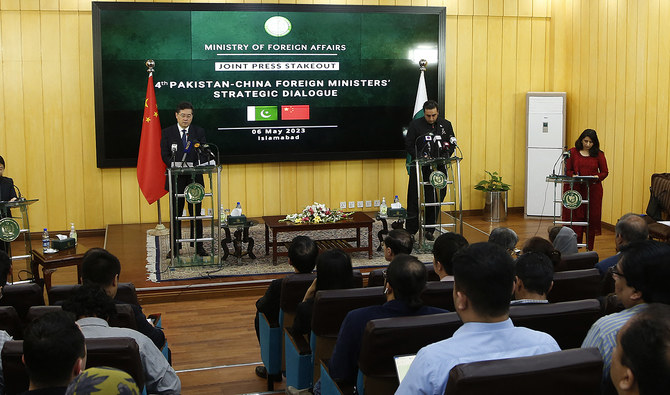ISLAMABAD: Chinese Foreign Minister Qin Gang on Sunday reiterated his country’s commitment to ensure the “timely completion” of an economic corridor connecting Pakistan and China, despite India’s recent objections to it.
The China-Pakistan Economic Corridor (CPEC) is a central part of Beijing’s Belt and Road Initiative, under which it has pledged over $65 billion for energy and infrastructure projects in Pakistan since 2013. Through the corridor, China aims to access land and sea routes to markets in the Middle East and Europe.
A key part of the CPEC runs through Gilgit-Baltistan, a northern mountainous region administered by Pakistan, which is the South Asian country’s only land link to China. It is also part of the disputed Kashmir territory which both Pakistan and India have been claiming since gaining independence in 1947, and over which they have fought two wars.
India, which claims Gilgit-Baltistan is part of its territory occupied by Pakistan, has said any development in these areas would be tantamount to violation of its territorial integrity and sovereignty.
Speaking to reporters in Goa after the Shanghai Cooperation Organization’s (SCO) Council of Foreign Ministers’ meeting earlier this week, India’s External Affairs Minister S. Jaishankar repeated the corridor would violate India’s territorial integrity, adding that he had informed all SCO members of New Delhi’s longstanding policy on the matter.
Pakistan’s army chief Syed Asim Munir met Gang on Sunday to discuss matters of regional security and defense, among other issues, the media’s military wing said.
“Foreign Minister Qin Gang underscored the importance of the longstanding strategic relationship between the brotherly nations and expressed his satisfaction over the progress made on the CPEC while reiterating China’s commitment to its timely completion,” the Inter-Services Public Relations (ISPR) said.
Munir also pledged “full support” for CPEC and thanked China for its “unwavering support” for Pakistan on regional and international issues.
Gang appreciated Pakistan’s efforts in maintaining regional peace and stability, especially the support of its armed forces in providing security to Chinese nationals and projects in Pakistan, the ISPR added.
“The two dignitaries also discussed the evolving security situation in the region. COAS acknowledged China’s role in promoting peace and stability in the region, and both sides agreed to enhance their existing cooperation in defense and security domains to effectively counter common security challenges,” the ISPR said.

















